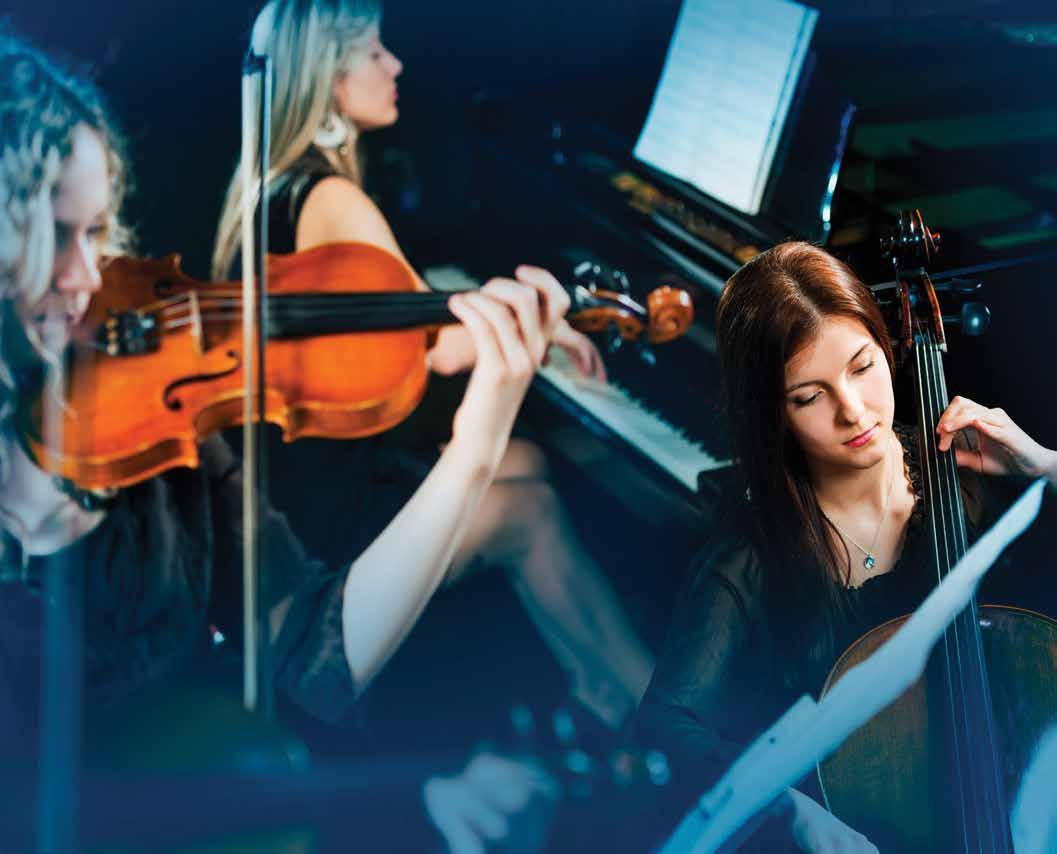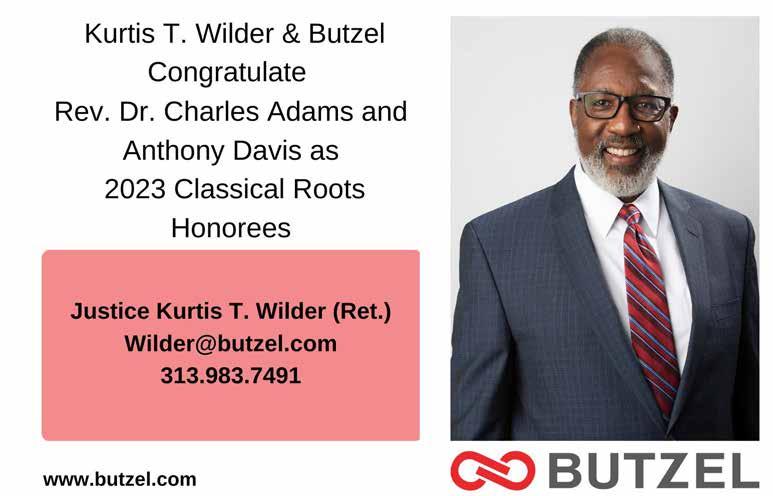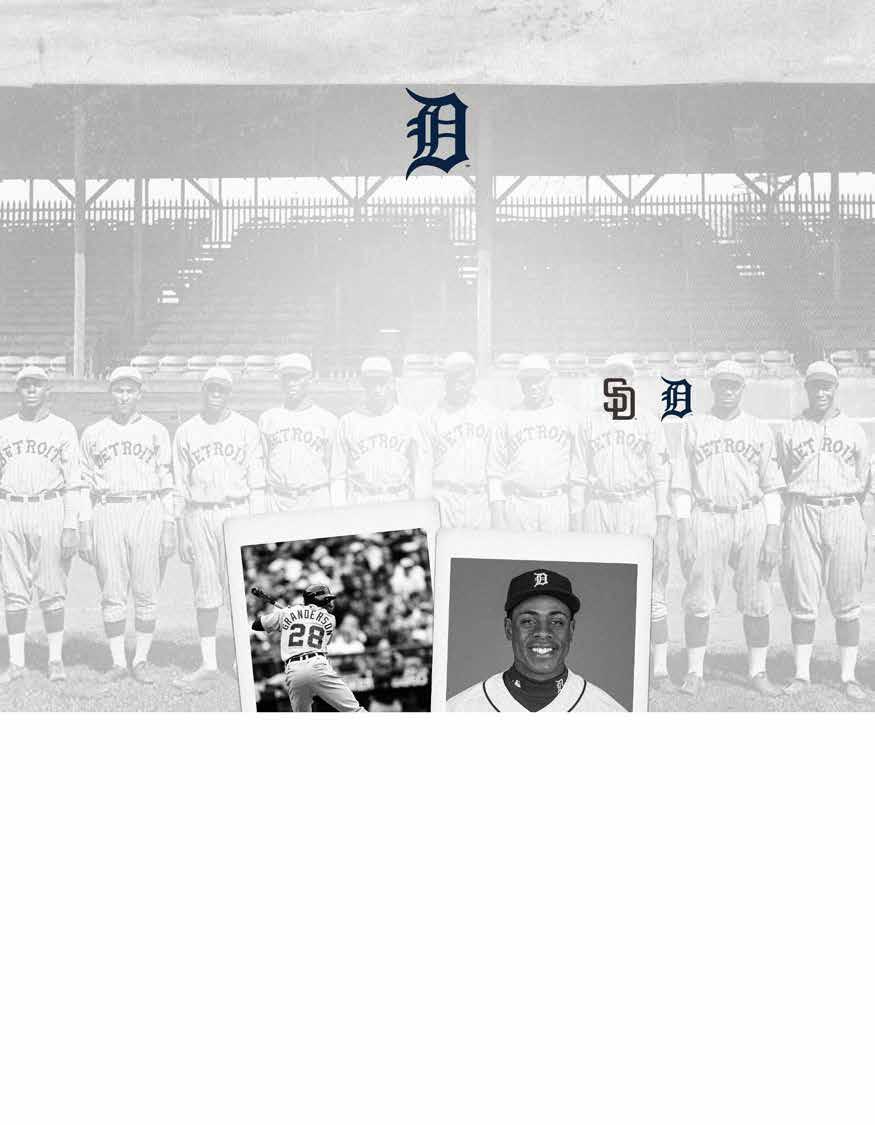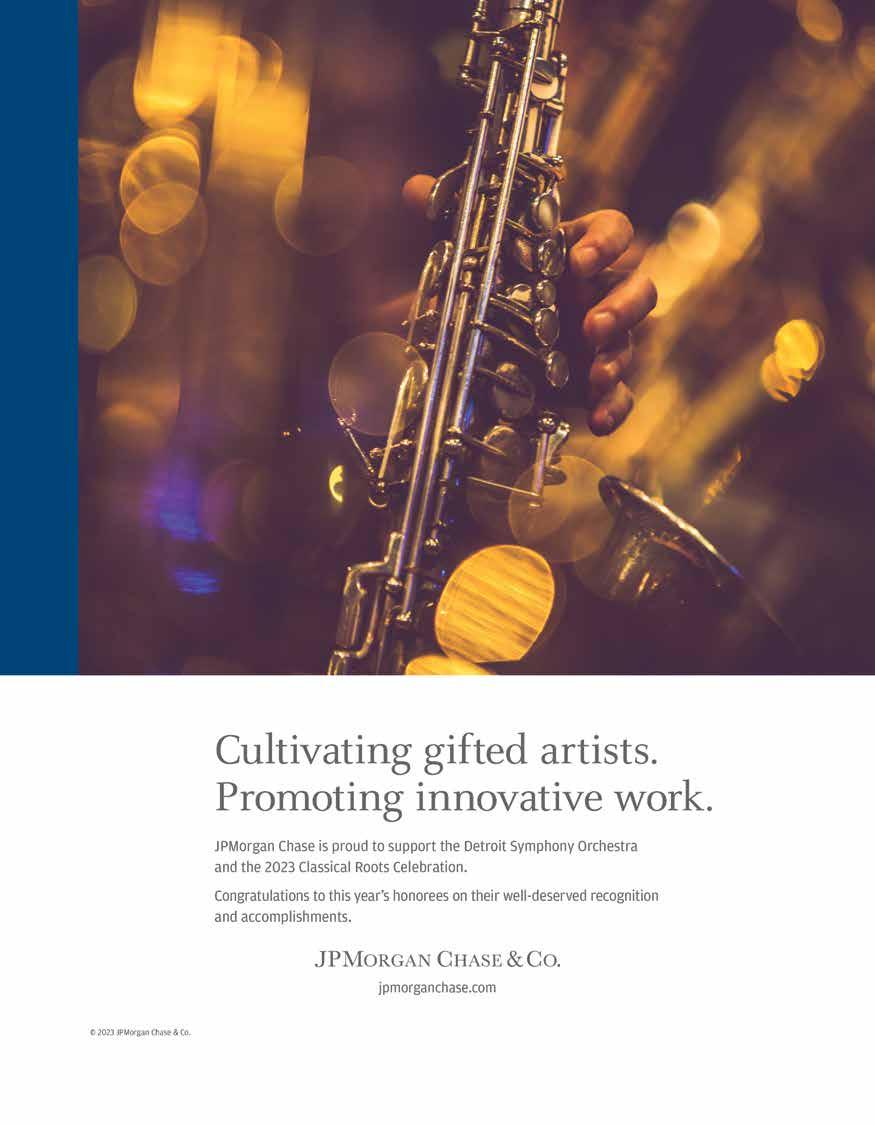


We appreciate and applaud the Classical Roots Steering Committee’s commitment to the Detroit Symphony Orchestra. Congratulations on this year’s successful celebration!
Judy & Stanley Frankel



We appreciate and applaud the Classical Roots Steering Committee’s commitment to the Detroit Symphony Orchestra. Congratulations on this year’s successful celebration!
Judy & Stanley Frankel

Welcome to the 2023 Arthur L. Johnson –Honorable Damon Jerome Keith Classical Roots Celebration. We are very pleased to welcome you to Orchestra Hall for what is bound to be a powerful concert featuring the Detroit Symphony Orchestra, bass-baritone Davóne Tines, clarinetist Anthony McGill, poet jessica Care moore, and the Brazeal Dennard Chorale, all led by Na’Zir McFadden, the DSO’s Assistant Conductor and Phillip and Lauren Fisher Community Ambassador.
We have much to celebrate this year and will begin by applauding the 50th anniversary of the Brazeal Dennard Chorale—a cherished Detroit institution founded in 1972 by choral director and educator Brazeal Dennard, one of the incredible visionaries who started Classical Roots with the DSO just six years later. The Brazeal Dennard Chorale has performed at every Classical Roots program since the beginning, and we are honored to welcome them back this evening during their jubilee season.
Tonight, for our 45th Classical Roots concert and 22nd Celebration, we recognize the achievements of three remarkable people: Dr. Charles G. Adams, the venerable minister, educator, and community and civil rights leader who has spent a life in music throughout his numerous endeavors and accomplishments; Anthony Davis, the composer, pianist, and educator whose music captivates us while challenging our conceptions about music’s impact on our world and inspiring us to come to terms with social and historical injustices;
and Kris Johnson, the trumpeter, composer, and educator, who came up in our Civic Youth Ensembles and is now giving back to the next generation of musicians. We are thrilled to present Kris with this year’s Marlowe Stoudamire Award for Innovation and Community Collaboration.
We must thank the Classical Roots Steering Committee, expertly co-chaired by Linda Forte and Priscilla Perkins, for making this year’s Celebration such a success. Lastly, we thank all of you. Through your ongoing support, the DSO remains committed to the mission of Classical Roots to celebrate African Americans in classical music, from our African American Orchestra Fellowship to regular programming by African American and Black composers, performances in the community, and vital music education for Detroit students.
Enjoy the evening!
 Erik Rönmark President & CEO
David T. Provost Chair, Board of Directors
Erik Rönmark President & CEO
David T. Provost Chair, Board of Directors
Arts enrich our lives and foster cultural awareness like few other experiences. That’s why the DTE Foundation supports local organizations which celebrate the role that the arts play in the communities where we live and serve.

the Detroit Symphony Orchestra’s Classical Roots concerts have increased the awareness of the significant contributions that African American composers and musicians have made to classical music.
The Arthur L. Johnson – Honorable Damon Jerome Keith Classical Roots Celebration, held in conjunction with the concerts since 2001, supports the Classical Roots mission. Funds raised through the Celebration provide increased opportunities for African Americans in classical music through DSO programs like the African American Orchestra Fellowship and African American Composer Residency.

We celebrate REVEREND DR. CHARLES G. ADAMS for his commitment and long-standing support of Classical Roots.
We applaud the extraordinary talents of composer and pianist ANTHONY DAVIS. • Chacona & Harold Baugh
LIFETIME DIRECTORS
Samuel Frankel ◊
Stanley Frankel
David Handleman, Sr. ◊
Dr. Arthur L. Johnson ◊
James B. Nicholson
Anne Parsons, President Emeritus ◊
Barbara Van Dusen
Clyde Wu, M.D.◊
Deceased ◊
OFFICERS OF THE BOARD OF DIRECTORS
David T. Provost
Chair
Erik Rönmark President & CEO
Faye Alexander Nelson Vice Chair
Laura Trudeau
Treasurer
James G. Vella Secretary
Ralph J. Gerson Officer at Large
Glenda D. Price, Ph.D. Officer at Large
Shirley Stancato Officer at Large
CHAIR EMERITI
Peter D. Cummings
Mark A. Davidoff
Phillip Wm. Fisher
Stanley Frankel
Robert S. Miller
James B. Nicholson
BOARD OF DIRECTORS
David Assemany, Governing Members Chair
Michael Bickers
Amanda Blaikie Orchestra Representative
Elena Centeio
Renato Jamett, Trustee Chair
Ismael Ahmed
Richard Alonzo
Hadas Bernard
Janice Bernick
Elizabeth Boone
Gwen Bowlby
Dr. Betty Chu
Karen Cullen
Joanne Danto
Stephen D’Arcy
Maureen T. D’Avanzo
Jasmin DeForrest
Afa Sadykhly Dworkin
James C. Farber
Abe Feder, Musician Representative
Linda Forte
Carolynn Frankel
Maha Freij
Christa Funk
Robert Gillette
Jody Glancy
Sandy Morrison
Frederick J. Morsches
Jennifer Muse, NextGen Chair
Sean M. Neall
Eric Nemeth
Maury Okun
Jackie Paige
Vivian Pickard
Denise Fair Razo
Gerrit Reepmeyer
James Rose, Jr.
Laurie Rosen
Elana Rugh
Marc Schwartz
Carlo Serraiocco
Lois L. Shaevsky
Mary Shafer
Ralph Skiano, Musician Representative
Richard Sonenklar
Rob Tanner
Yoni Torgow
Gwen Weiner
DIRECTOR EMERITI
Floy Barthel
Chacona Baugh
Penny B. Blumenstein
Richard A. Brodie
Lois Cohn
Marianne Endicott
Sidney Forbes
Herman H. Frankel
Dr. Gloria Heppner
Ronald Horwitz
Bonnie Larson
Arthur C. Liebler
Harold Kulish
David McCammon
David R. Nelson
William F. Pickard, Ph.D.
Marilyn Pincus
Lloyd E. Reuss
Marjorie S. Saulson
Alan E. Schwartz
Jane Sherman
Arthur A. Weiss
Dave Everson Orchestra Representative
Aaron Frankel
Herman B. Gray, M.D., M.B.A.
Laura HernandezRomine
Rev. Nicholas Hood III
Richard Huttenlocher
Renato Jamett Trustee Chair
Daniel J. Kaufman
Michael J. Keegan
Xavier Mosquet
David Nicholson
Arthur T. O’Reilly
Stephen Polk
Bernard I. Robertson
Nancy Tellem
Laura J. Trudeau
David M. Wu, M.D.
Ellen Hill Zeringue
Malik Goodwin
Mary Ann Gorlin
Donald Hiruo
Michelle Hodges
Julie Hollinshead
Sam Huszczo
John Jullens
Laurel Kalkanis
Jay Kapadia
David Karp
Joel D. Kellman
John Kim
Jennette Smith Kotila
Leonard LaRocca
William Lentine
Linda Dresner Levy
Florine Mark

Anthony McCree
Kristen McLennan
Tito Melega
Lydia Michael
H. Keith Mobley
Scott Monty
Shari Morgan
Donnell White
Jennifer Whitteaker
R. Jamison Williams
Margaret E. Winters
The Classical Roots Celebration is an extraordinary event that recognizes the contributions of African American composers, musicians, and humanitarians. The Celebration is the result of the collaborative efforts of the Classical Roots Steering Committee and the DSO staff, in partnership with civic, community, and corporate leaders. The Steering
Committee consists of more than 40 volunteers from the Metro Detroit business community who share a passion for preserving and celebrating the musical contributions of African Americans. Each Steering Committee volunteer supports the success of the Celebration in a number of ways, including through service on a subcommittee.

ABOUT THIS YEAR'S PHOTOGRAPHER: Daniel A. Washington, a lifelong Detroiter, is a leader, creative, and a doer with a passion for real estate and community development. In 2017, he founded NW Goldberg Cares—a community development organization. He is inspired by creating relatable brands, impactful programs, and meaningful experiences. A 2021 Crain’s Detroit 20 in Their Twenties awardee, Washington has more than five years of experience in public space creation, entrepreneurship, fundraising, and transformative, intentional community-centric development.


We are honored to support Classical Roots and the contribution it makes to artistic excellence with the DSO’s inclusive culture. Thank you for contributing to the richness of our community. with love,
Congratulations to our own, Dr. Charles Adams on this well-deserved honor! & Hats Off to Anthony Davis!
PRESENTING SPONSOR
Stanley & Judy Frankel
MGM GRAND DETROIT IS PROUD TO SUPPORT THE DETROIT SYMPHONY ORCHESTRA’S 2023 CLASSICAL ROOTS CELEBRATION

COMMUNITY ENGAGEMENT SPONSORS
AAA Michigan
Corewell Health
GAA Manufacturing
Central Michigan UniversityDetroit Campus
Howard Morris

Huntington National Bank
Jones Day
Peter and Julie Cummings
Linda Forte and Tyrone Davenport
Phillip and Lauren Fisher
TRM Equity
OH Pye II Funerael Home
Renaissance (MI) Chapter of the Links
EDUCATION SPONSORS
Drs. David M. and Bernadine Wu
Education Enrichment Services
Fifth Third Bank
Dr. Herman Gray and Shirley M. Gray
Greektown Casino Hotel
Robert and Mary Ann Gorlin
The Children's Foundation

Oakland University
Regena Robinson
Wayne State University
DONATIONS IN HONOR OF CHARLES G. ADAMS:
Linda Forte and Tyrone Davenport
Regina Robinson
W. Harold and Chacona W. BaughMGM Grand Detroit, we feel it is important to respect each other’s differences. choose to embrace these differences to achieve best-in-class experiences and cultivate stronger ties with our guests, employees, neighbors, and partners. We are committed to stand up to issues of equality and aim to better unify our world.
MGM GRAND DETROIT IS PROUD TO SUPPORT THE DETROIT SYMPHONY ORCHESTRA’S 2023 CLASSICAL ROOTS CELEBRATION
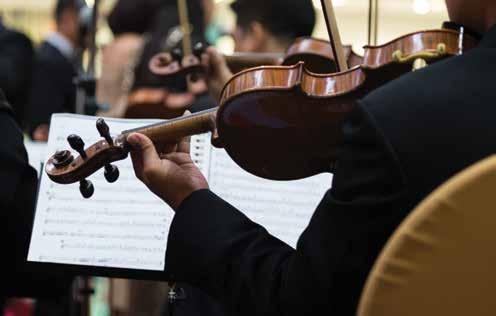
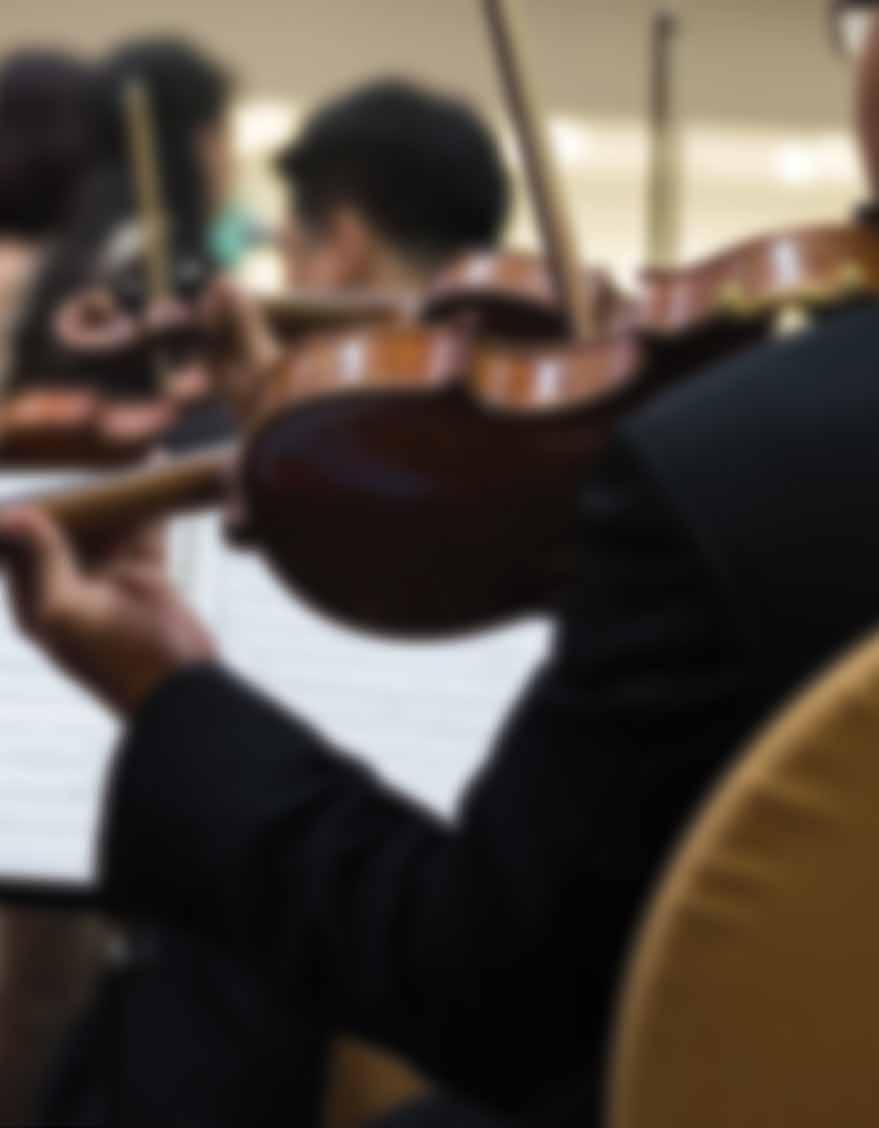
At MGM Grand Detroit, we feel it is important to respect each other’s differences.
We choose to embrace these differences to achieve best-in-class experiences and cultivate stronger ties with our guests, employees, neighbors, and partners. We are committed to stand up to issues of equality and aim to better unify our world.
We congratulate and salute Dr. Charles G. Adams and Anthony Davis on this well-deserved honor!
—Joanne Danto and Arnold Weingarden—
5:00pm 6:00pm
4

Doors open & Cocktails
PETER D. & JULIE F. CUMMINGS CUBE
Seated Dinner
PETER D. & JULIE F. CUMMINGS CUBE
8:00pm
45th Annual Classical Roots Concert
ORCHESTRA HALL
10:30pm
Dessert & Dancing Afterglow
PETER D. & JULIE F. CUMMINGS CUBE
JADER BIGNAMINI, Music Director
Detroit Symphony Orchestra, Na’Zir McFadden, conductor
Brazeal Dennard Chorale, Alice McAllister Tillman, artistic director ± Anthony McGill, clarinet ^ • Earl Howard, Kurzweil synthesizer ‡ Davóne Tines, bass-baritone∞ • jessica Care moore, poet *
JOHN ROSAMOND JOHNSON Lift Every Voice and Sing ± (1873 - 1954)
Lyrics by JAMES WELDON JOHNSON arr. ROLAND CARTER
ADOLPHUS HAILSTORK O Praise the Lord ± (Orchestra Tacet) (b. 1941) Rochelle Mitchell, Yvonne Turner, Darrius Washington, Carl Clendenning
TRADITIONAL Hold On! ±
arr. NORAH DUNCAN IV Alice McAllister Tillman, Tuesday Rambo McCall
ANTHONY DAVIS
You Have the Right to Remain Silent (b. 1951) Concerto for Clarinet/contra-alto clarinet, Kurzweil synthesizer, and ensemble in four movements ^ ‡
I. Interrogation II. Loss
III. Incarceration
IV. Dance of the Other
FLORENCE PRICE
(1887 - 1953)
VARIOUS
Concert Overture No. 2
(“Go Down Moses,” “Ev'ry Time I Feel the Spirit,” “Nobody Knows the Trouble I've Seen”)
Concerto No. 1: SERMON devised by Davóne Tines ∞ *
Movement 1
Recitation: Excerpt from The Fire Next Time, by James Baldwin
John Adams, "Shake the Heavens" from El NiÑo (A Nativity Oratorio)
Movement 2
Recitation: Hope by Langston Hughes
Igee Dieudonné & Davóne Tines, “Vigil”
Movement 3
EXEGESIS by jessica Care moore
Anthony Davis, "You Want the Truth, but You Don't Want to Know," from X: The Life and Times of Malcom X (1986)
 JEFF TYZIK
Principal Pops
Conductor
TERENCE BLANCHARD Fred A. Erb Jazz Creative Director Chair
NA’ZIR MCFADDEN Assistant Conductor, Phillip & Lauren Fisher Community Ambassador
LEONARD SLATKIN Music Director Laureate NEEME JÄRVI Music Director Emeritus
Music Directorship endowed by the Kresge Foundation
JEFF TYZIK
Principal Pops
Conductor
TERENCE BLANCHARD Fred A. Erb Jazz Creative Director Chair
NA’ZIR MCFADDEN Assistant Conductor, Phillip & Lauren Fisher Community Ambassador
LEONARD SLATKIN Music Director Laureate NEEME JÄRVI Music Director Emeritus
Music Directorship endowed by the Kresge Foundation
Today we honor the contributions of AfricanAmerican classical composers, musicians and educators. AAA supports the Detroit Symphony Orchestra in furthering their legacy through the DSO Classical Roots Celebration.

Henry Ford Health is pleased to sponsor the Detroit Symphony Orchestra’s Classical Roots Celebration honoring African-American composers, musicians, and educators. Diversity is the foundation on which Henry Ford Health stands. We value and embrace the wealth of the diversity reflected in our patients, our workforce and partners, and the many diverse communities we serve.

JOHN ROSAMOND JOHNSON/ARR. CARTER

Scored for 2 flutes, oboe, 2 clarinets, bassoon, 4 horns, 3 trumpets, 3 trombones, tuba, timpani, and strings.
(Approx. 5 minutes)
Lift Every Voice and Sing was first performed, in poetry form, in commemoration of President Lincoln’s birthday on February 12, 1900, by a choir of 500 schoolchildren from the segregated Stanton School in Jacksonville, Florida—hometown of sibling creators John Rosamond and James Weldon Johnson. The poem was set to music five years later.
Voicing the cry for liberation and affirmation for African American people, the song was declared “The Negro National Anthem” by the NAACP in 1919. It gained new popularity as a protest song during the Civil Rights Movement and was entered into the Congressional Record in the 1990s as the official African American National Hymn.
In his second autobiography Along This Way, James Weldon Johnson describes the emotion in writing Lift Every Voice and Sing: “I could not keep back the tears, and made no effort to do so.” He later reported that creating the song’s lyrics was the greatest satisfaction of his life.
Lift Every Voice and Sing has been sung at the beginning of every Classical Roots concert since the event’s inauguration in 1978.
Composed 2007 | Premiered 2007 | Revised 2011
ANTHONY DAVISB. February 20, 1951, Paterson, NJ Scored for solo clarinet (doubling on contra-alto clarinet), Kurzweil synthesizer, flute, oboe, clarinet, bassoon, horn, trumpet, trombone, percussion, harp, and strings.
(Approx. 25 minutes)
Anthony Davis is an internationally renowned composer of operatic, symphonic, choral, and chamber works, and a winner of the Pulitzer Prize for his opera The Central Park Five. He is best known for his operas X: The Life and Times of Malcolm X, Under the Double Moon, The Central Park Five, and Tania
You Have the Right to Remain Silent was written in 2007 for clarinetist J.D. Parran and Kurzweil synthesizer player Earl Howard. Parran and the Perspectives Ensemble premiered the work in 2007 at New York’s Miller Theatre.
Of this piece, Davis writes the following: “You Have the Right to Remain Silent, for solo clarinet, Kurzweil, and chamber ensemble, takes its inspiration from the Miranda warning. The piece was conceived as a concerto for clarinetist J.D. Parran with realtime processing by Earl Howard on the Kurzweil. I tried to approach ‘Silence’ as, rather than John Cage’s apolitical world of ‘white privilege,’ a much more dangerous space. In the first movement, ‘Interrogation,’ I imagined the clarinet being interrogated by the orchestra as the orchestra utters ‘You have the right to remain silent.’ In the second movement, ‘Loss,’ a phasing texture slowly emerges as the orchestration gains momentum through metric modulation, setting up an improvised duet with the contra-alto clarinet and the Kurzweil. This section concludes with an homage to Charles Mingus with a melodic variation for the contra-alto clarinet in F minor
that starts as a dirge and ends in swing. The third movement, ‘Incarceration,’ involves the percussion, with more text from the Miranda in contrast to the clarinet and Kurzweil. I have always been fascinated by the relationship of speech to rhythm, from Sprechstimme to hiphop. The Kurzweil processes both the clarinet and the percussion. The final movement, ‘Dance of the Other,’ begins with a rather simple melody that suggests the fantasy of otherness.”
This performance marks the DSO premiere of Davis’s You Have the Right to Remain Silent.
Price’s Concert Overture No. 2 was composed between her second and third symphonies. The first half of this work is based on three spirituals portrayed in miniature scenes: Go Down, Moses; Nobody Knows the Trouble I’ve Seen; and Ev’ry Time I Feel the Spirit Composed in 1943, the musical character of these spirituals moves rapidly in succession from somber, to poignant, to exuberant. The second half of this overture takes excerpts in the form of melodic fragments from the first three sections into a unified portrait closing with a return of Go Down, Moses as a symbolic cry for liberation.
Composed 1943 | Premiered 1943
FLORENCE PRICE
Scored for 2 flutes, piccolo, 2 oboes, english horn, 2 clarinets, bass clarinet, 2 bassoons, 4 horns, 3 trumpets, 3 trombones, tuba, timpani, percussion, harp, and strings. (Approx. 14 minutes)
Florence Beatrice (Smith) Price was the most widely known African American woman composer from the 1930s until her death in 1953. After graduating as valedictorian of her class at the age of 14, she enrolled at the New England Conservatory of Music where she studied organ and piano performance, and later composition with George Chadwick and Frederick Converse.
Price was the first Black female composer to have a symphony performed by a major American orchestra—her Symphony No. 1 in E minor, premiered by the Chicago Symphony Orchestra on June 15, 1933. The premiere brought instant recognition and accolades to Price, yet much of her music eventually fell into neglect due to “a dangerous mélange of segregation, Jim Crow laws, entrenched racism, and sexism” (Women’s Voices for Change, 2013). Price’s compositions reflect a romantic nationalist style, while incorporating African American musical forms.
Price was known for her settings of spirituals, which have been performed by some of the 20th century’s greatest vocalists including Marian Anderson and Leontyne Price. Although much of Price’s music remained unpublished until after her death, the rights to her work were acquired in 1918 by G. Schirmer, and recent scholarship and research has led to an increase in frequency of orchestras around the world performing her works. Her Concert Overture No. 2 might have been lost if it wasn’t for the good fortune and hard work of Tom Dillard and Tim Nutt, librarians at the University of Arkansas who found this work among Price’s assets in her late Chicago residence.
This performance marks the DSO premiere of Florence Price’s Concert Overture No. 2.

Devised 2021 / Premiered 2021
VARIOUS COMPOSERS
DEVISED BY DAVÓNE TINES
Scored for 4 flutes, 3 oboes, 2 clarinets, 2 bassoons, 3 horns, 2 trumpets, 3 trombones, timpani, percussion, harp, 2 keyboards, and strings.
(Approx. 20 minutes)
Of Concerto No. 1: SERMON, Davóne Tines writes the following:
“Before I was a singer, I was a violinist for 14 years. I deeply love the broader
orchestral repertoire and, as a young person, dreamed of performing concertos with major orchestras. When I became a singer, I didn’t want to leave that dream behind. With Concerto No. 1: SERMON, I wanted to begin to explore what it might mean for a singer to dialogue with an orchestra in the same way.
The complication that singing adds is the likely necessity of words. And with the addition of words, there is the likely addition of explicit meaning. If a concerto is essentially a statement made by a soloist in dialogue with an orchestra, then what could be expressed if this notion of a ‘statement’ is made more literal or even more personal through words? Should the words be poetic? Prose? Abstract? Direct? The notion of an abstract personal statement is intrinsic in the instrumental (e.g. wordless) concerto form. Solo instrumentalist artists have been doing this for centuries via their readings and interpretations of wordless musical texts. We surmise that we get a sense of an individual artist's persona and personality through their interpretation. Some appreciate the anonymity that abstraction affords the artist and audience alike, but for me, as an artist of classical music in a fraught contemporary context, I find there is an incredible opportunity and need for a classical artist to be in direct, unmitigated, intentional, and non-abstract communication with an audience. So, what did I want to say?
In the Fall of 2020, I was invited by Philadelphia Orchestra Musical Director Yannick Nézet-Séguin to perform John Adams’s The Wound Dresser. That beautiful, impressionistic piece, made on a text by Walt Whitman, can be understood as an extolling of the importance of care; but at the particular time, after yet another resurgence in attention paid to the undue deaths of Black people at the hands of police, this time Breonna Taylor and George Floyd, I wanted to say something more personal, less abstract, and utterly direct.
I decided to explore the idea of delivering a sermon to speak to the majority white audience I would encounter; to make an appeal to that group which holds the most power and accountability in the matters of systemic and institutionalized racist violence.
There's a lot of different kinds of sermons, and I chose the idea of an exegesis sermon, the tradition I was most familiar with growing up in the Black Baptist church of rural Northern Virginia. In an exegesis, a speaker takes scriptures and expounds on them in order to share a principle or value. I wanted to share with an audience what it might mean to be a marginalized identity, wanting to be able to exist in a way in spite of marginalization. So, in order to tell that story, I chose three different poetic and prose texts by Black writers to serve as ‘scriptures,’ and paired them with three arias or songs that elucidate the texts.
The program starts with a text by James Baldwin excerpted from his A Letter to My Nephew used to introduce his book The Fire Next Time. In the text, Baldwin explores an idea of what it might mean or imply for marginalized people to exist beyond the fixed roles prescribed by their marginalization. That text is followed by John Adams’s Shake the Heavens from his El Niño oratorio which sonically shows a person moving into humanity almost by force, by shaking the heavens and the earth and disrupting reality or the majority expected identity of said person.
The next text is a short poem by Langston Hughes titled Hope. The idea being that a Black person claiming humanity isn’t a violent act, but rather a simple, human act. And what more human act is there than expressing emotion? And in this particular song, I wanted to express the human emotion of hope.
Then there's an interrogation. At the golden mean, there's a moment where the audience is asked to contend with the fact that myself or someone of a marginalized identity even ever feels the
need to defend their humanity in the first place. The audience has seen me announce my humanity, then demonstrate, and now I ask: ‘Why do I still feel the need to prove my humanity to you?’
I asked my dear colleague and incredible writer jessica Care moore to create a text in response to that question. This text is in lineage with the text of an aria I premiered from John Adams’s opera Girls of the Golden West based on an excerpt from Frederick Douglass’s staggering 1852 speech What to the Slave Is the Fourth of July?, which states: ‘Is it not astonishing that, while we are ploughing, planting and reaping,... living, moving, acting, thinking,... we are called upon to prove that we are men!’
What does it mean for someone to be existent in a place where they feel they need to defend the basic fact that they're human? This critical sentiment is brilliantly expressed in the main aria from Anthony Davis’s X: The Life and Times of Malcolm X titled ‘You want the truth, but you don’t want to know.’ The aria spells out that the crime and violence Malcolm X is accused of is a reflection of the systemically dehumanizing violence that was enacted upon him and his family for his entire life.
So, hopefully this direct personal statement, delivered as a sermon, in the form of a concerto, provokes the audience to question their complicity in a society that continues, through generations, to provoke marginalized people, Black people, to prove that we are deserving of the so-called inalienable rights afforded to those who are undeniably human.”
This performance marks the DSO premiere of Concerto No. 1: SERMON devised by Davóne Tines.
Robyn Bollinger
CONCERTMASTER
Katherine Tuck Chair
Kimberly Kaloyanides
Kennedy ASSOCIATE CONCERTMASTER
Schwartz and Shapero Family Chair
Hai-Xin Wu
ASSISTANT CONCERTMASTER
Walker L. Cisler/Detroit Edison Foundation Chair
Jennifer Wey Fang
ASSISTANT CONCERTMASTER
Marguerite Deslippe*
Laurie Goldman*
Rachel Harding Klaus*
Eun Park Lee*
Adrienne Rönmark*
Alexandros Sakarellos*
Drs. Doris Tong and Teck Soo
Chair
Laura Soto*
Greg Staples*
Jiamin Wang*
Mingzhao Zhou*
Adam Stepniewski
ACTING PRINCIPAL
The Devereaux Family Chair
Will Haapaniemi*
David and Valerie McCammon Chairs
Hae Jeong Heidi Han*
David and Valerie McCammon Chairs
Elizabeth Furuta*
Sheryl Hwangbo Yu*
Daniel Kim*
Sujin Lim*

Hong-Yi Mo*
Marian Tanau*
Alexander Volkov*
Jing Zhang*
VIOLA
Eric Nowlin
PRINCIPAL
Julie and Ed Levy, Jr. Chair
James VanValkenburg
ASSISTANT PRINCIPAL
Caroline Coade
Henry and Patricia Nickol
Chair
Glenn Mellow
Hang Su
Shanda Lowery-Sachs
Hart Hollman
Han Zheng
Mike Chen
CELLO Wei Yu
PRINCIPAL
Abraham Feder
ASSISTANT PRINCIPAL
Dorothy and Herbert Graebner Chair
Robert Bergman*
Jeremy Crosmer*
Victor and Gale Girolami Cello
Chair
David LeDoux*
Peter McCaffrey*
Joanne Deanto and Arnold
Weingarden Chair
Una O’Riordan*
Mary Ann & Robert Gorlin
Chair
Cole Randolph*
BASS
Kevin Brown
PRINCIPAL
Van Dusen Family Chair
Stephen Molina
ASSISTANT PRINCIPAL
Christopher Hamlen
Brandon Mason
Nicholas Myers^
HARP
OPEN
PRINCIPAL
Winifred E. Polk Chair
FLUTE
Hannah Hammel Maser
PRINCIPAL
Alan J. and Sue Kaufman and Family Chair
Amanda Blaikie
Morton and Brigitte Harris Chair
Sharon Sparrow
ASSISTANT PRINCIPAL Bernard and Eleanor Robertson Chair
Jeffery Zook
Shantanique Moore §
PICCOLO
Jeffery Zook
Shari and Craig Morgan Chair
OBOE
Alexander Kinmonth
PRINCIPAL
Jack A. and Aviva Robinson
Chair
Sarah Lewis
ASSISTANT PRINCIPAL
Monica Fosnaugh
ENGLISH HORN
Monica Fosnaugh
Shari and Craig Morgan Chair
CLARINET
Ralph Skiano
PRINCIPAL
Robert B. Semple Chair
Jack Walters
PVS Chemicals Inc./ Jim and Ann Nicholson Chair
Shannon Orme
E-FLAT CLARINET
OPEN
BASS CLARINET
Shannon Orme Barbara Frankel and Ronald Michalak Chair
BASSOON
Conrad Cornelison
PRINCIPAL Byron and Dorothy Gerson Chair
Michael Ke Ma
ASSISTANT PRINCIPAL
Marcus Schoon
Jaquain Sloan §
CONTRABASSOON
Marcus Schoon
HORN
Karl Pituch
PRINCIPAL
Johanna Yarbrough
Scott Strong Ric and Carola Huttenlocher Chair
David Everson
ASSISTANT PRINCIPAL
Mark Abbott
TRUMPET
Hunter Eberly
PRINCIPAL
Lee and Floy Barthel Chair
Stephen Anderson
ASSISTANT PRINCIPAL
William Lucas
TROMBONE
Kenneth Thompkins
PRINCIPAL
David Binder
Adam Rainey
BASS TROMBONE
Adam Rainey
TUBA
Dennis Nulty
PRINCIPAL
TIMPANI
Jeremy Epp
PRINCIPAL Richard and Mona Alonzo Chair
James Ritchie
ASSISTANT PRINCIPAL
PERCUSSION
Joseph Becker
PRINCIPAL
Ruth Roby and Alfred R. Glancy III Chair
Andrés PichardoRosenthal
ASSISTANT PRINCIPAL
William Cody Knicely Chair
James Ritchie
LIBRARIANS
Robert Stiles
PRINCIPAL
Ethan Allen
LEGACY CHAIRS
Principal Flute
Women’s Association for the DSO

Principal Cello
James C. Gordon
PERSONNEL
MANAGERS
Patrick Peterson
DIRECTOR OF ORCHESTRA
PERSONNEL
Benjamin Tisherman
MANAGER OF ORCHESTRA
PERSONNEL
Nolan Cardenas
AUDITION AND OPERATIONS
COORDINATOR
STAGE PERSONNEL
Dennis Rottell
STAGE MANAGER
William Dailing
DEPARTMENT HEAD
Zachary Deater
DEPARTMENT HEAD
Isaac Eide
DEPARTMENT HEAD
Kurt Henry
DEPARTMENT HEAD
Steven Kemp
DEPARTMENT HEAD
Matthew Pons
DEPARTMENT HEAD
Jason Tschantre
DEPARTMENT HEAD
—————————————
LEGEND
* These members may voluntarily revolve seating within the section on a regular basis
^ Extended Leave
§ African American Orchestra Fellow
to Anthony Davis, Reverend Dr. Charles Adams and Our Detroit Symphony Orchestra.
We are so proud to honor you tonight.
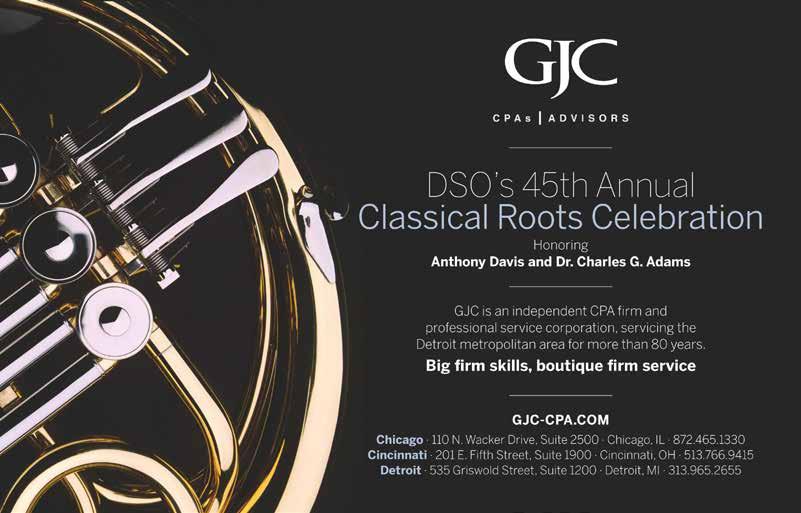
Alice McAllister Tillman, Artistic Director
Michele Cotton Stanfield, Assistant Conductor

Krystal Thomas, Accompanist
Rosilyn Stearnes-Brown, Librarian
Yvonne C. Turner, Executive Director
Soprano
Jacqueline Boswell
Julie Devine
Lyric Elliott
Marlena Hampton
Tuesday Rambo McCall
Vanessa Noble
Deborah O’Neal
Janice Myles Simon
Daryl Taylor
Yvonne Turner
Alto
Ida Abbington
Michele Cotton Stanfield
Madonna Draughn
Sadarra Fields
Camile Hanna
Juanita Jeffries
Carolyn Kent
Rochelle Mitchell
Desirae Nelson
Rosilyn Stearnes-Brown
Asia Van Horn-Lee
Ayona Van Horn-Lee
Contralto
Marcia Cotton Flint

Jacqueline Howard
Tenor
Elijah Anderson (High School Intern)
Malcolm Davis
Brandon Hodges
Terry Horn
Bass/Baritone
Carl Clendenning
Gregory Coble
Theodore Jones
Michael McFarland
James Parks
Michael Rowan
Raymond Shephard
Terrence Stewart
For half a century, Detroit’s own Brazeal Dennard Chorale has been committed to remembering, preserving, and discovering the music of African American composers and artists. Nationally known for its expressive renditions of African American music in the choral tradition, the Chorale is one of the oldest organizations of its kind in America.
In 1972, the Brazeal Dennard Chorale was established with a mission to promote the music of African American composers and to perpetuate the heritage of the Negro Spiritual. This highly skilled group of singers not only preserves this rich musical heritage, but also performs music from all genres of Choral Music repertoire at the highest level. Established during a time when classical music opportunities were limited for African Americans, the Chorale sought to provide people in Detroit with an opportunity to perform classical choral music. Dr. Brazeal Wayne Dennard, the chorale’s founder, aimed to nurture the artistic needs of his singers, using this ensemble as a method of developing a vibrant musical culture within the city of Detroit and its talented community members.
The Chorale and the Detroit Symphony Orchestra have a longstanding history of partnership. This partnership began in 1978,
after members of the Brazeal Dennard Chorale presented a plan to DSO management to address inequities within the classical music industry in Detroit and highlight works by African American composers, as well as showcase more African American musicians in DSO performances. Brazeal Dennard, working collaboratively with Paul Freeman—the DSO’s then-Resident Conductor—and several notable community leaders, organized and facilitated the first Classical Roots concert held in 1978 at Detroit’s historic Bethel AME Church. The choir was anchored by the Brazeal Dennard Chorale and included chorus members from Detroit-area Black churches. Dr. Dennard reported, “that was the beginning of the Classical Roots concert that the symphony performs today.” This concert model has now been implemented by orchestras and music organizations across the country. The Chorale has remained a major part of Classical Roots each year since, opening each concert with a performance of John Rosamond Johnson’s Lift Every Voice and Sing.
The Chorale has been a leader in championing the classical music heritage of African American composers. Under the leadership of Artistic Director Alice McAllister Tillman, they maintain a value system
that fosters bridge-building, innovation, collaboration, community, inclusivity, and excellence. Through performances, commissions of new choral works, recordings, and engaging with communities across America, the Chorale is continuing the tradition of African Americans who sang unaccompanied melodies which told of the pains of slavery, the yearning to be free, and the hope of God’s salvation. Recently, the Chorale participated in a commission consortium through Chorus America. The work, Make Some Noise, Get in Trouble (Good Trouble, Necessary Trouble), composed by Roland M. Carter commemorates the memory of the Honorable John R. Lewis and was premiered by the Brazeal Dennard Chorale in April of 2022.
The Brazeal Dennard Chorale is an award-winning organization that in 2018 received the Brazeal Wayne Dennard Award (presented by Chorus America) in recognition of the Chorale’s commitment to diversity, inclusiveness, and furthering African American choral traditions and other diverse choral music traditions through performance, research, or the creation of new compositions of significance.
The
congratulates the Brazeal Dennard Chorale on an incredible 50 years!by HANNAH ENGWALL

Anthony Davis is an internationally renowned composer of operatic, symphonic, choral, and chamber works, and an educator committed to fostering the next generation of musical talent. With diverse artistic influences across his family, life, career, and education, Davis has developed a unique voice that blurs the lines between jazz, opera, world music, and avant-garde.

Born in Paterson, New Jersey in 1951, Davis is the product of a musical family. His father was an English professor and professional musician, and his mother was a dancer. “I was always around music,” recalls Davis. The family lived in Harlem for a time, and it was in their apartment on 138th Street where Davis first played piano—in diapers on the lap of American jazz pianist, composer, broadcaster, and educator Billy Taylor, who lived in the same building.
“Music was part of my family’s legacy, but everyone in my family did other things too,” said Davis. “When I decided to be a musician and composer, at first, they were really wary—I was supposed to go to law school. But it was something I had to do, and they realized I had to do it. It was funny for me because music was always an escape from all the tensions in the world. I’d just sit at the piano and play, and imagine I was Art Tatum. I would turn all the lights out and just play. The piano was a big, big part of how I dealt with growing up.”
When he was in tenth grade, the family moved to Italy as Davis’s father taught on a Fulbright scholarship. “That was a key point when I realized a different kind of relationship to music: as a composer,” said Davis. “In Italy, I acquired a Thelonious Monk record and fell in love with the music and the idea
BY LESLIE D. GREENof Thelonious Monk, a great composer who was performing his own music. I ended up learning the record by listening to it and then started to write my own pieces too. It was in Italy where I started to compose—to really compose—and take a greater interest in jazz.”
After Davis returned to the United States, he continued to expand his influences. He studied at Wesleyan and Yale universities and put together his own band and ensembles, allowing him to perform and develop as a musician.
He recalls an encounter with Duke Ellington at Yale, when the legendary musician was in town for a fellowship: “I had a huge afro at the time—giving Angela Davis a run for their money. I was across the room and Duke came into the room and pointed to me, and he said, ‘you must be a musician,’ and I thought well, if Duke says so, then I guess so.”
Davis has composed seven operas, including X: The Life and Times of Malcolm X (1986, revived in 2022 at Detroit Opera), Under the Double Moon (1989), Amistad (1997), and Wakonda’s Dream (2007). His most recent opera, The Central Park Five, which premiered at Long Beach Opera in 2019, received the 2020 Pulitzer Prize for Music.
In addition to his accomplishments as a musician and composer, Davis contributes to musical heritage as an educator. He was Yale's first Lustman Fellow, teaching composition and African American studies. In 1987, Davis was appointed Senior Fellow with the Society for the Hu-
I’m
of creating a body of work that hopefully helps to open doors for others after me. I’m proud to represent the idea that music can speak about the issues of our time and address them, that music is not divorced from them or some kind of anesthesia from them. Music can address our reality, and that concept has been so important to me. It can allow you to make an emotional and visceral connection—whether it’s identifying with Malcolm X, or the Central Park Five, or with a clarinet player who’s being interrogated in a concerto—the idea is to foster that kind of identification and emotional connection that the audience can make with the issues of our time and with what’s going on so it’s not just some abstract or alien thing, or something that can be pushed aside as not relating to them.”
Anthony Davismanities at Cornell University, and in 1990, he returned to Yale University as Visiting Professor of Music. He became Professor of Music in African American Studies at Harvard University in the fall of 1992, and assumed a full-time professorship at the University of California at San Diego in January 1998.
Davis feels a great responsibility to support the next generation of artists. “I want my students to learn that there is no box—to not settle on what music was in the past or what the limitations were. They should try to follow through with their vision and imagine their own freedom. I think that’s very important because it feels revolutionary. The most revolutionary thing to do is to imagine your freedom and that you have no limitations—that there’s nothing that can get in the way of what you envision.”
Davis also feels a responsibility to support and uplift African American composers and musicians, and in 1995 took part in the DSO’s African American Composer Residency
program, which exposed him to Detroit’s vibrant musical culture.
“African American music is great music. It gives you a different vision of music and shows that we can have different influences.” Davis feels that the legacy of jazz and improvision is especially vital to the continued tradition of American music. “By representing the breadth of American music, not just the more Eurocentric of it, we can continue to create a unique identity for the American orchestra.”
“It means that you create a path— your own path—but a path that others can build on and follow, and veer from if they want. The idea is to put ideas and energy in motion to move things forward. People like Duke Ellington, Billy Strayhorn, Charles Mingus, and Alvin Singleton inspired me to see what I could create. I hope that I can do the same thing for the next generation and others who follow me.”
most proud

Dr. Charles Gilchrist Adams, affectionately known as the “Harvard Hooper,” has been cited in Ebony magazine as one of the greatest preachers in the United States. He is Pastor Emeritus of Hartford Memorial Baptist Church, with close to 10,000 members, and formerly served as president of the Progressive National Baptist Convention, the denomination of Dr. Martin Luther King Jr.
“As a young child, Charles would sit in the first pew during church services,
looking right at the pastor,” said Edith Adams Clifton, the sister of Dr. Adams. “And then he would come home and preach the whole sermon—he knew that was what he wanted to do.”
The two siblings grew up in Detroit, surrounded by music in their church community. Dr. Adams studied in the Detroit Public Schools system and at the Detroit Conservatory of Music, receiving a well-rounded music education. The family attended DSO educational concerts at the Masonic Auditorium and jazz performances by greats like Ella Fitzgerald at the Paradise Theatre, on the site of Orchestra Hall from 1941-1951.
Throughout Dr. Adams’s education at Cass Technical High School, the University of Michigan, and the Harvard Divinity School, music remained a common thread. At Michigan, he was the first Black tenor soloist with the Men's Glee Club, and later graduated cum laude. At Harvard, he served as an organist and leader of daily chapel services. He graduated Harvard Divinity School with honors and went on to become a tenured professor at the school as the first William and Lucille Nickerson Professor of the Practice of Ethics and Ministry.
Dr. Adams also completed a fellowship at Morehouse College in Atlanta, where he served as the teaching assistant to Dr. Martin Luther King Jr. A fervent civil rights advocate, Dr. Adams enjoyed relationships with many leaders of the time, and later led the prayer at the funeral for Rosa Parks, where he passionately thanked the civil rights icon in more than 15 languages.
At a time when many churches didn’t want to be involved in the Civil Rights

Movement, leaders like Dr. Adams started a new denomination where activists would be welcome: the Progressive National Baptist Convention, where he served as president.
It was during his time at Morehouse College that Dr. Adams met Dr. James Abbington (now Associate Professor of Church Music and Worship at Candler School of Theology at Emory University in Atlanta). The pair later worked together at Hartford Memorial Baptist Church, where Dr. Adams served as senior pastor for more than 50 years, now Pastor Emeritus.
“I observed on numerous occasions the students, interns, young ministers, seasoned ministers, and pastors that sought out his advice, mentorship, and counseling,” said Dr. Abbington. “There was no mistake that he was certainly one of the greatest preachers in the English-speaking world, and people came to learn from him.”
Dr. Adams and his Hartford congregation have served the entire Detroit community, seeking to care for not only their spiritual health, but also other practical needs. “Hartford Church and Charles and his trustees were very active in civil rights, but they were also very active in what they call ‘silver rights,’ meaning that they felt that the community needed to invest in the economy, in economic development,” said Clifton.
The church bought up a large swath of vacant commercial properties, seeking to create opportunities for Black business ownership and employment. Their largest project was the development of a Super Kmart (now Home Depot), built from the ground up, which employed more than 200 people and brought tax rev-
“Dr. Adams embodies the passage of scripture that talks about how
He looked for excellence in worship. He looked for excellence in ministries. Hartford Church was a very blessed church in that there were a number of very well-educated people, but it wasn't about just being in a church full of people who were credentialed. He wanted them to think intellectually. He wanted them to seek the best in whatever it was that we did. He felt that God deserved the best. People around him knew he had a contagious desire for perfection and brought a high level of quality and substance.”
enue to the city.
Under Dr. Adams’s leadership, Hartford invested heavily in scholarship funds, seeking to help high school and college students pursue education. He was instrumental in a partnership with the Presbyterian Villages of Michigan to build Detroit’s first gated community for senior citizens, Hartford Village. During the COVID-19 pandemic, Hartford opened its doors as a testing site and vaccination center for the community. The congregation also provides weekly grocery distribution to families in need.
“Dr. Adams is a very generous pastor and friend. It was almost like he couldn’t say no. If someone had a need, he would find a way to meet it,” said Dr. Abbington.
Dr. Adams is also a strong supporter of classical music: Hartford has presented concerts of DSO chamber ensembles, the University of Michigan Men’s Glee Club, and many HBCU choral groups, exposing families and youth to classical music without charge. Hartford has enjoyed a multitude of collaborations with local and national musical organizations
including the Warren Symphony Orchestra, the Dearborn Symphony Orchestra, and Detroit Opera. For more than 50 years, Hartford has annually presented Handel's Messiah free of charge to a diverse audience from across Metro Detroit.
In the 1980s, Dr. Adams was instrumental in the installation of a massive new organ at Hartford—the largest ecclesiastical purchase of its kind of any Black church in the United States—ensuring the space served not only as a house of worship, but also as a place to host exceptional musical experiences.
Since the inception of Classical Roots, Dr. Adams has served as a key partner and supporter. He enjoyed a close relationship with instrumental Classical Roots figure Brazeal Dennard, uniting on their shared belief in the importance of celebrating musical diversity.
Through his life’s work in ministry, education, social action, community activism, and music, Dr. Adams has enriched Classical Roots, Hartford, the City of Detroit, and beyond in immeasurable ways.

The DSO is pleased to honor musician and educator Kris Johnson as this year’s recipient of the Marlowe Stoudamire Award for Innovation and Community Collaboration.


Johnson is a Detroit-based trumpeter, composer, arranger, film scorer, and educator with an expansive career for an artist so young. He has played in and arranged for the renowned Count Basie Orchestra; composed musicals including Jim Crow’s Tears and Hastings Street: The Musical; scored films including the Emmy-nominated web series King Ester; and produced successful personal projects, such as his #looptherapy album and his Kris Johnson Big Band YouTube series.
Johnson has served as Director of Jazz Studies at the University of Utah; a Project Director for Pontiac School District, leading a U.S. Department of Education Arts in Education - Model Development
and Dissemination Grant; and as the Education and Digital Programming Manager for the Motown Museum. He has also served on the teaching faculty at The Ohio State University and the DSO’s Civic Youth Ensembles, and as an Artistic Liaison for JazzEd Detroit through a partnership with ArtOps and the Fred A. and Barbara M. Erb Family Foundation. Currently, Johnson is the Director of Michigan State University’s Community Music School – Detroit and teaches through his online platform, Office Hours with Kris
Johnson empowers students with effective teaching methods and creates an environment of kindness and warmth where the next generation of musicians can feel safe, supported, and inspired.
The Marlowe Stoudamire Award for Innovation and Community Collaboration is presented annually in memory of late Detroit community leader Marlowe Stoudamire. Stoudamire helped guide the mission of Classical Roots and inspired innovation and creativity as a member of the Steering Committee for six years. He was an enthusiastic and engaged supporter of the arts and youth development in Detroit and served a mentor to innumerable young professionals and leaders in the community.
In 2022, the DSO celebrated Chris Harrington, former DSO Senior Director of Jazz and @ The Max and current President and CEO of the Ordway Center for the Performing Arts, as the inaugural recipient of this award.
The DSO lost a dear friend and leader when Anne Parsons passed away in March 2022 following a courageous battle with cancer.

During her tenure as President and CEO from 2004-2021, Anne led with grace, courage, and conviction, never wavering from her strongly held belief that the DSO is the best in the world, and that Detroit is a vibrant and resilient city that deserves an orchestra to match.
“Anne attended her first Classical Roots concert while being recruited for the position of DSO President & CEO,” said 2020 Classical Roots Honoree Chacona Baugh. “From that moment on, she enthusiastically supported the mission of Classical Roots. Her commitment led to the strengthening and broader acceptance of the concert and celebration, as well as the expansion of community and educational programming that uplifts African American musicians and highlights their contributions to classical music. The DSO community, the Classical Roots Steering Committee, and the entire Detroit community has been forever impacted by Anne’s extraordinary leadership.”


American conductor Na’Zir McFadden is the newly appointed Assistant Conductor and Phillip & Lauren Fisher Community Ambassador of the Detroit Symphony Orchestra.
In this position, he works closely with Music Director Jader Bignamini and guest conductors on both the PVS Classical Series and William Davidson Neighborhood Concert Series. Additionally, he leads pre-concert lectures at Orchestra Hall, and conducts a variety of programs on the Educational Concert Series, Young People’s Family Concert Series, and PNC Pops Series, as well as DTE Community Concerts.
Also commencing in the 2022-23 season, Na’Zir begins his tenure as Music Director of the Detroit Symphony Youth Orchestra. This season, they will present three programs—exploring the symphonies of Dvořák, Tchaikovsky, and Florence Price.
An advocate for arts education, McFadden strives to provide access to the arts for students in underserved communities. This season, McFadden will make appearances with youth ensembles in Salt Lake City and with the Philadelphia AllCity Music Festival. In the past, he’s
worked with youth ensembles in Chicago, New York City, St. Louis, and Los Angeles.
Recent engagements include a recording project with the Civic Orchestra of Chicago as part of the Chicago Symphony Orchestra’s “Notes for Peace” initiative—which featured Hilary Hahn as guest soloist.
McFadden was the inaugural Apprentice Conductor of the Philadelphia Ballet Orchestra from 2020 to 2022, where he worked with Music Director Beatrice Jona Affron. He also served as the Robert L. Poster Conducting Apprentice of the New York Youth Symphony from 2020 to 2021.

Na’Zir conducted his hometown orchestra—The Philadelphia Orchestra—in their “Pop-Up” series in 2017, where he met Music Director Yannick Nézet-Séguin, who has been a mentor ever since. The Philadelphia Inquirer praised his “great stick [baton] technique and energetic presence on the podium” in their review of the concert.
Recent and upcoming engagements include a series of commissions with Orchestra 2001 and appearances with the Utah Symphony and the Philadelphia Ballet.

Driving Mobility Solutions in Historically Excluded Communities
Equitable Mobility Research
Mobility Program Design and Management

EVSE Incentive Research and Coordination
EV Charger Assessments and Installation Management

Designing turnkey installation solutions for the advancement of EV charging infrastructure
The transition to electrified mobility requires equitable investment in infrastructure. According to the McKinsey Center for Future Mobility, by 2035, the largest automotive markets will go electric.
As part of our commitment to ensuring that historically excluded communities have equitable access to the clean energy economy, we work with diverse businesses to provide, install, and maintain clean energy equipment so that everyone can fully participate in the rapidly transforming decarbonization movement.
Walker-Miller provides strategic EV infrastructure guidance for and deployment of Electric Vehicle Service Equipment (EVSE). We are a certified provider and installer of clean energy and generation products, including:


• Tesla Charging Stations

• PowerWall Home Battery and Solar Panels

Hailed for his “trademark brilliance, penetrating sound and rich character” (The New York Times), clarinetist Anthony McGill is one of classical music’s most recognizable and brilliantly multifaceted figures. In addition to his dynamic international solo and chamber music career, McGill is principal clarinet of the New York Philharmonic—the first African American principal player in the organization’s history.
In 2020, he was awarded the Avery Fisher Prize, one of classical music’s most significant awards given in recognition of soloists who represent the highest level of musical excellence. McGill was honored to take part in the 2009 inauguration of President Barack Obama, premiering a piece written for the occasion by John Williams and performing alongside violinist Itzhak Perlman, cellist Yo-Yo Ma, and pianist Gabriela Montero.
McGill appears regularly as a soloist with top orchestras around North America, including the New York Philharmonic, Metropolitan Opera, Baltimore Symphony Orchestra, San Diego Symphony, and Kansas City Symphony. This season he’ll solo in the US premiere of EsaPekka Salonen’s Kínēma for solo clarinet and orchestra with the
New York Philharmonic. He’ll also serve as the Orlando Philharmonic’s Artist-in- Residence, and during this series of performances he’ll premiere a new clarinet arrangement of the Bologne (Chevalier de Saint-Georges) Violin Concerto in A major, Op. 5, No. 2.

This past June, he performed as part of The Re-Collective Orchestra, the first-ever all-Black orchestra to play the Hollywood Bowl, in a CNN broadcast commemorating the first year Juneteenth was recognized as a federal holiday.
A graduate of the Curtis Institute of Music, McGill previously served as the principal clarinet of the Metropolitan Opera and associate principal clarinet of the Cincinnati Symphony Orchestra.
McGill serves on the board of directors for Cedille Records and the Harmony Program, and on the advisory councils for the InterSchool Orchestras of New York and The Time In Children’s Arts Initiative. He is a Vandoren Artist and Buffet Crampon Artist.

Earl Howard has been performing his compositions in the United States and Europe for over fifty years. His recent compositions include music for live electronics, electronic tape music, as well as music for electronics and instruments. Howard’s method of creating orchestrated sounds with electronics and adding live, improvisational performance creates a unique, densely layered composition. Earl creates sounds from scratch using all synthesis (granular, additive, frequency modulation and vector) techniques. Live processing with musicians is central to his work.
Howard has performed at numerous venues including Merkin Hall, the Whitney Museum, The Kitchen, The Knitting Factory, Experimental Intermedia, Roulette, and Carnegie Recital Hall. In 2011, Earl Howard received a Guggenheim Fellowship. In 2004, his first sound installation was commissioned for the Tiffany Collection at the Queens Museum of Art. In the spring of 2003, Howard had a Regents Fellowship
at UCSD. Howard received three New York Foundation for the Arts Fellowships. In 1998, Howard was the recipient of Harvard’s Fromm Foundation Commission. He graduated from California Institute of the Arts in Music Composition in 1974.

Howard has performed frequently with improvisers including Georg Graewe, Mari Kimura, Anthony Davis, Mark Dresser, Anne LeBaron, JD Parran, Gustavo Aguilar, Thomas Buckner, and George Lewis. Earl recently performed as a synthesist for Anthony Davis with the New York Philharmonic, where he processed principal clarinetist Anthony McGill, the percussion section, and the entire orchestra.
Howard has also produced numerous soundtracks for some of the leading film and video artists including Nam June Paik, Mary Lucier, Rii Kanzaki, Bob Harris, and Bill Brand.

Davóne Tines is a path-breaking artist whose work not only encompasses a diverse repertoire, from early music to new commissions by leading composers, but also explores the social issues of today. A creator, curator, and performer at the intersection of many histories, cultures, and aesthetics, he is engaged in work that blends opera, art song, contemporary classical music, spirituals, gospel, and songs of protest, as a means to tell a deeply personal story of perseverance that connects to all of humanity. His projects include Recital No. 1: MASS, a program exploring the Mass woven through Western European, African American, and 21st century traditions, which he performs this season at Carnegie Hall and other venues; Concerto No. 1: SERMON and Concerto No. 2: ANTHEM, two programs he conceived for voice and orchestra that weave arias and contemporary song, including arrangements by Tines, with poetry; and Everything Rises, a multimedia musical work exploring artistic journeys and family histories, co-created with violinist

Jennifer Koh. Tines is Philharmonia Baroque Orchestra & Chorale’s Creative Partner and in January 2023 he becomes Artist-in-Residence at Brooklyn Academy of Music. He recently served as Artist-inResidence at Detroit Opera—an appointment that culminated in his performance in the title role of Anthony Davis’s X: The Life and Times of Malcolm X, and he is featured on the world premiere recording of X with Odyssey Opera and Boston Modern Orchestra Project, released this fall on BMOP/ sound. Tines is a member of AMOC and co-creator of The Black Clown, a music theater experience commissioned and premiered by The American Repertory Theater. He is Musical America’s 2022 Vocalist of the Year and a recipient of the 2020 Sphinx Medal of Excellence. He is a graduate of The Juilliard School and Harvard University, where he also serves as guest lecturer.











SHINOLA HOTEL & DETROIT OPERA HOUSE
Saturday, March 18, 2023












Event proceeds benefit dance education programs throughout metro Detroit and mainstage programming at the Detroit Opera House. For questions and reservations, please contact Zach Suchanek, Stewardship Coordinator 313.237.3427 | zsuchanek@detroitopera.org | Or visit detroitopera.org/aneveningwithailey
Fifth Third Bank proudly supports the arts in the communities we serve. Because creativity makes our communities a Fifth Third better® for everyone.

Wayne State University proudly supports the Detroit Symphony Orchestra’s Arthur L. Johnson – Honorable Damon Jerome Keith Classical Roots Celebration. Thank you for shining a light on the many ways that African American artists have contributed to classical music — and for ensuring that the door stays open for those stars who are on the rise.
jessica Care moore is the CEO of Moore Black Press, Executive Producer of Black WOMEN Rock!, and founder of the literacy-driven Jess Care Moore Foundation. An internationally renowned poet, playwright, performance artist, and producer, she is the 2013 Alain Locke Award Recipient from the Detroit Institute of Arts. moore is the author of The Words Don’t Fit in My Mouth, The Alphabet Verses
The Ghetto, God is Not an American, Sunlight Through Bullet Holes, and a memoir, Love is Not The Enemy. Her poetry has been heard on stages including Carnegie Hall, Lincoln Center, and the London Institute of Contemporary Arts. She has performed on every continent and believes poems belong everywhere and to everyone.

Born in Detroit, moore first came to national prominence when she won on the legendary “It’s Showtime at the Apollo” competition a record-breaking five times in a row. Her searing performance of the poem “Black Statue of Liberty” earned moore several meetings
with high profile publishing companies, but in 1997, she paved her own path and launched a publishing company of her own, Moore Black Press. She released her first book, The Words Don’t Fit In My Mouth, and sold more than 20,000 copies. Along with her own work, she proudly published famed poets such Saul Williams, Shariff Simmons, Def Poetry Jam’s co-founder Danny Simmons, NBA player Etan Thomas, Ras Baraka, and former Essence Magazine editor Asha Bandele.
She was the host, writer, and coExecutive Producer of the poetry driven television show, Spoken, which was executive produced by and directed by Robert Townsend and aired on The Black Family Channel. moore’s poetry is featured on Nas’s Nastradamus album, Talib Kweli’s Attack The Block Mix Tape, and she is a returning star of Russell Simmons’s HBO Series, “Def Poetry Jam.”

 by LATOYA CROSS
by LATOYA CROSS

Distinctive in appearance with its tube-like shape that looks as if it's been folded in two, the bassoon carries a whimsical aural aesthetic. Its low notes and versatile musicality produce both bounce and poppy tunes, as well as velvety rich melodies that pull attention toward emotional elements in a composition.
“We can really sing and give this chocolatey tone that sings over the orchestra. It doesn’t project well, so you have to really listen for it, and I like that because you have to pull people in with you,” expresses Jaquain Sloan, bassoonist, and DSO African American Orchestra Fellow. “I want you to come into this zone and see this nest that I’m making for you…come into the music with me.”
Like the lyrical and jovial characteristics of the bassoon, at the root of Sloan’s artistic palette is deep storytelling—in addition to orchestral playing, he also sings with social justice choirs and has even dabbled in acting. A North Carolina native, his exploration of instruments started when he joined the band in middle school and played percussion. The bassoon, however, was the instrument that held his attention and challenged him on a different level.
“It’s one of the most versatile winds. It gave me a challenge that the other instruments didn’t because of the complicated fingering system,” he says. “I would sit in front of the
computer and just learn scales. I was in a zone learning it and mastering it.”
Sloan’s dedication earned him a full collegiate scholarship to the Peabody Conservatory of The Johns Hopkins University where he earned a Bachelor of Music degree in bassoon performance. He also holds a Master of Music degree and Performance Certificate from the University of Southern California and earned an Honorable Mention in the 2023 Sphinx Orchestral Partners Auditions (SOPA) Excerpt Competition. He has performed with the Los Angeles Philharmonic, Baltimore Symphony Orchestra, and Debut Symphony; as well as in a tribute to composer Tania León during the 45th Annual Kennedy Center Honors.
As a person who did not always see himself reflected on stage in classical music, Sloan credits the DSO fellow-
ship with providing a clearer path for the future of his artistry. “Being here in Detroit with the DSO, I’ve gotten the confidence from my peers and colleagues that I can do this and being in an orchestra could very well be my future,” he says. “I have a duty to my people, my classical music Black people, to help drive initiatives that educate and show us here.”
Representation not only on stage, but also in understanding the depths of what Black and brown communities have contributed to the field of classical music is why the Classical Roots concert is a highlight for Sloan. “There’s a feeling that you get with Classical Roots,” he says with adrenaline still pumping from the DSO’s 2022 performance with Wynton Marsalis and the Jazz at Lincoln Center Orchestra.
“You saw people who are deep in classical music and that’s their life, and then people who are deep in jazz and other musical styles; it’s all combining, and everyone is hootin’ and hollerin’—all the stuff that has Black roots in an artistic way, and the musicians loved it—the flow of artistry was vibrating.”
He adds, “I have always wanted to create some kind of fusion between all the worlds in classical music— when you mix and mingle different genres and do it in an artistic way that is pleasing to the listeners and the players, it makes the music that much more powerful.”
I have a dutyto my people, my classical music Black people, to help drive initiatives that educate and show us here.
Jacquain Sloan
 by LATOYA CROSS
by LATOYA CROSS

In graduate school, flutist and educator, Shantanique Moore wrote down one sentence in her journal: “I hope one day to play with the Detroit Symphony Orchestra.”
Moore was studying under DSO Assistant Principal Flute Sharon Sparrow when an opportunity to sub with the orchestra presented itself.
“I just had knots in my stomach. I remember when I stepped onto the stage and sat down, I looked around. The stage felt so bright; it felt like all the light was on me. It was a very intense feeling. When I heard the first sound, all I could say was, ‘Whoa.’ I had never played in a group that sounded this good.”
Fast-forward to 2022 when Moore won her audition to become an African American Orchestra Fellow with the DSO, where she now graces the stage in Orchestra Hall alongside her mentor.
Prior to her appointment, the Detroit native—who grew up in Redford Township— completed a fellowship with the Pittsburgh Symphony’s Orchestra Training Program for African American Musicians and performed with the orchestra extensively for two years.
This career rotation also speaks to Moore’s artistic evolution. A DSO Civic Youth Ensembles alum, it was during those early Saturday morning rehearsals where she fell in love with orchestral playing and committed to the flute. But, when it was time to decide her college major, there was a brief tug-of-war between music and medicine. “When I would come to CYE rehearsals, I couldn’t imagine not playing my flute in the orchestra,” she recalls.
The singing quality of the flute attracted her. “That’s the closest thing to the human voice and I always wished I could sing,” she says. “I also love the way the instrument feels; the way it vibrates in my hands when I play. It’s beautiful.”
Music won and continues to grant her experiences and a journey she never thought possible.
With a bachelor’s and master’s degree in Flute Performance from Wayne State University, music has led to performances with the Toledo Symphony, the Fort Wayne Philharmonic and accolades including First Prize in the Ervin Monroe Young Artist Competition, the Southern Great Lakes Concerto Competition, and the Wayne State Concerto Competition. She also co-hosted The Progressive Flutist–a podcast that cultivated conversations about classical music in the 21st century.
Through music and being in flow with what the universe calls upon her creative ventures, Moore has the power to bring healing through sound.
“When I set out to do this as a career, I didn’t know exactly what was going to happen. I am grateful. As an orchestra fellow, my mission is to show up and deliver on stage here, and around the world; be present and show that this is for us too. It’s not lame,” she says. “I’m the Black girl sitting on stage playing the flute. You can be too.”
is to show up and deliver on stage here, and around the world; be present and show that this is for us too.
Shantanique Moore
THE DETROIT MUSICIANS ASSOCIATION, A BRANCH OF THE NATIONAL ASSOCIATION OF NEGRO MUSICIANS, INC., AN HISTORIC ORGANIZATION


SINCE 1919, SALUTES CLASSICAL ROOTS AND SUPPORTS ITS MISSION!


Chandler Park Academy provides an immersive education experience and nurturing environment that helps every student prepare for the real world, transition to adulthood and compete
Chandler Park Academy School District provides an immersive educational experience and nurturing environment that helps every student prepare for the real world, transition to adulthood and compete globally in the

Community engagement has been at the heart of Classical Roots since it began in 1978 and continues to be a driving force behind the annual celebration of African American composers and musicians today.
The Classical Roots mission has grown since its start as a concert featuring the Detroit Symphony Orchestra and Brazeal Dennard Chorale at the historic Bethel A.M.E. Church. In addition to adding a gala, fundraiser, and concert at Orchestra Hall, Classical Roots also supports increased opportunities for Black musicians through the DSO’s African American Composer Residency and African American Orchestra Fellowship.
In February, renowned pianist

BLKBOK returned to the Peter D. and Julie F. Cummings Cube for a special evening of music in celebration of Classical Roots. The high-energy performance featured live production of compositions that blended classical notes with pop forms, jazzy riffs, and hip-hop boldness—sounds that referenced BLKBOK’s love for rhythms and musicality ranging from Ice Cube and Tina Turner to Chopin and Bach.
The DSO also presented community and chamber offerings connected to Classical Roots. On February 12, DSO African American Orchestra Fellow Jaquain Sloan (bassoon) performed during Sunday services at the Hartford Memorial Baptist Church in Detroit. The program included Adolphus Hailstork’s Bassoon Set

Later in the month, DSO musicians
Heidi Han (violin), Sujin Lim (violin), Will Haapaniemi (viola), and Jeremy Crosmer (cello) curated and performed a Classical Roots chamber recital at Plymouth United Church of Christ in Detroit. The recital featured repertoire by African American composers including Kris Johnson (2023 recipient of the Marlowe Stoudamire Award for Innovation and Community Collaboration) and two selections by the Plymouth United Church of Christ Renaissance Choir. The program was presented in partnership with students from the Plymouth Educational Community and students from the Plymouth Sunday School.
On March 3, through the generosity of the DSO’s education sponsors, nearly 400 middle and high school students attended the morning Classical Roots concert. Students were greeted by conductor Na’Zir McFadden and enjoyed a special pre-concert presentation on the history of Classical Roots.
“Classical Roots began in the traditions of the Black church and in our community,” said Clare Valenti, the DSO’s Director of Community Engagement. “We are proud to honor this heritage each year by hosting community and educational events at venues throughout the city, spreading the mission of Classical Roots beyond the walls of Orchestra Hall and enriching the lives of people across Detroit.”
Congratulations Pastor Emeritus Rev. Dr. Charles G. Adams for being honored as part of the 2023 DSO Classical Roots Celebration....
To God Be The Glory!
Hartford Memorial Baptist Church Business Ministry






Congratulations to Dr. Charles Adams and Anthony Davis on this well-deserved honor!
We are proud to support the DSO and the mission of Classical Roots.
David & Bernadine Wu
Congratulations to our wonderful DSO family and Kudos for another extraordinary Classical Roots extravaganza!
With love and gratitude, Herman B Gray, MD and Shirley Mann Gray
“Living a life that matters doesn’t happen by accident. It’s not a matter of circumstance but of choice”
Our honorees chose to live lives that mattered.
Congratulations to the Detroit Symphony Orchestra on 45 of Classical Roots!
- Glenda Price -
- MICHAEL JOSEPHSON
“To live as an ethical arts leader means to lead with, center, and close all decision-making with ethics. We assume that everyone knows the difference between right and wrong, or at least that in a civil society social norms are powerful enough to steer leaders towards the most ethical decision. This assumption remains worthy of our focus in a time in history where making unethical decisions has grave consequences for the creative sector and culture.”
smtd.umich.edu



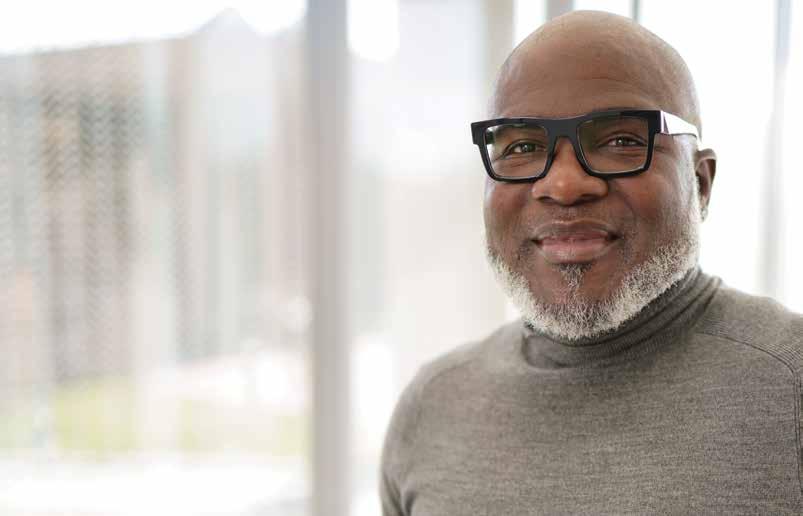
— Acclaimed author and SMTD professor Dr. Antonio C. Cuyler on being an ethical arts leader






Gilbert Family Foundation is proud to support the DSO’s e orts to raise awareness of the contributions of African-American composers and musicians, as well as increase opportunities for African-Amercians in classical music.

 Shantanique Moore Flute
African American Orchestra Fellow
Shantanique Moore Flute
African American Orchestra Fellow
We are proud to support the Detroit Symphony Orchestra’s Classical Roots concert celebrating
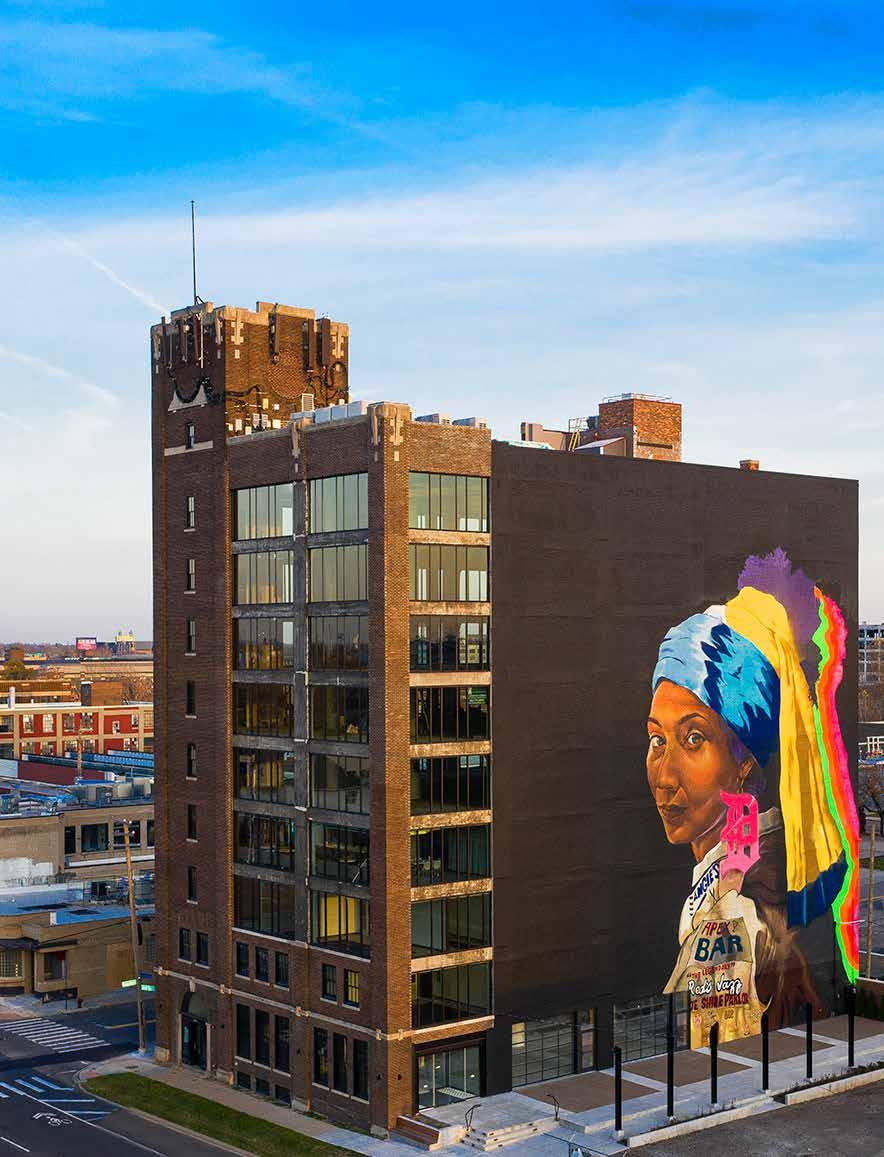
Composer Anthony Davis and Community leader Dr. Charles G. Adams
Julie and Peter Cummings
“The Girl With The D Earring” By Detroit Artist Sydney G. James Mural @ Chroma Milwaukee Junction, DetroitThe Detroit Office of Jones Day is proud to support the Detroit Symphony Orchestra and its mission to enrich lives around the globe through unforgettable musical experiences.
